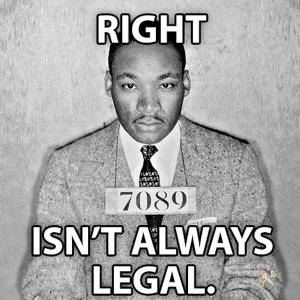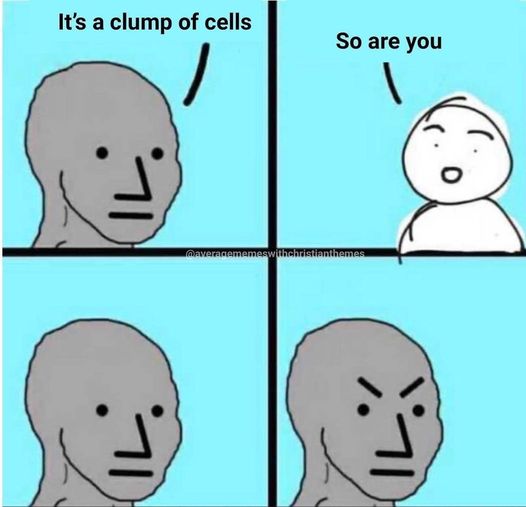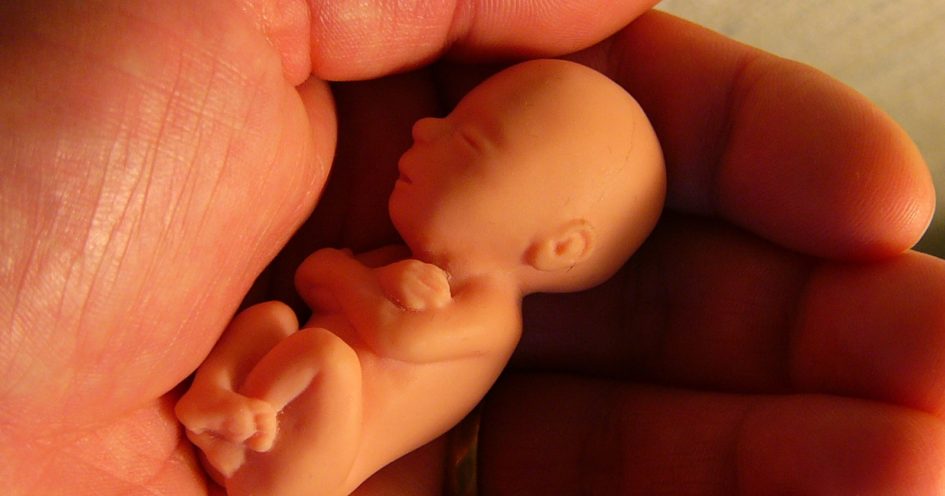Most people accept that there are strong religious arguments against abortion but those aren’t convincing for some people in those religions, let alone irreligious people.
Therefore, we present the most definitive argument for the pro-life position using science, logic, and common sense:
Science & Logic
Everyone reading this knows he or she has a right to life and that no one has the right to take that away. For example, we all know that it would be unjust, immoral, and wrong for someone to come up to you and kill you for no reason. That sense of injustice is due to the fact that you have a right to live. It doesn’t matter where that right came from, just that everyone recognizes that right. If you don’t recognize your right to life, send me an email, I know a sadist that would love to make your acquaintance.
Well, if everyone can accept that principle, it’s logical to extend that right to all human beings. How can some people say that they have a right to their life but other humans don’t? This seems hypocritical at the least and diabolically contradictory at worst. After all, who throughout history held this view? In the 1700s, slavers held that Africans didn’t have the right to life. In the 1930s, Nazis held that Jews didn’t have the right to life. Today, terrorists believe that Westerners in crowded places don’t have a right to life. Slavers, Nazis, and terrorists all believed that certain humans didn’t have the right to life. That’s not good company for pro-abortion activists to keep. If it’s not grotesquely inhuman it’s simply illogical.
The obvious retort (and the one that the above groups used) is that, well, fetuses aren’t humans. Some would even go as far to say that they’re not even alive. But those arguments are based on poor science or a dearth of dictionaries. If the fetus wasn’t alive, how could it move, metabolize, or emote? How could it circulate blood or grow? And, if the fetus wasn’t a human being, what species is it?
Some will say that it’s not a human, it’s a zygote or a blastula. Yes, a zygote is a zygote and a blastula is a blastula but in a woman’s uterus, they are human zygotes and blastulas. It’s clear that though they don’t look like adults, they still are homo sapien sapiens and are just a stage in development just like infant, adolescent, and elderly. While differentiation between these stages is gray, the difference between a human and a mouse, for instance, is not gray—it’s in the genes. But an acorn isn’t a tree! they will protest. Right, and a fetus isn’t an adult. They’re both different stages of a human, though, just as the acorn and tree may seem like dissimilar organisms but are both just different stages of an individual oak.
Okay, they’ll say, it’s alive and human, but it’s just part of the mother’s body, therefore the mother can kill it. But the human fetus has her own unique genetic code. She cannot be part of her mother’s body with unique DNA. {**note there are rare cases of chimerism where two fraternal twins are merged into one organism. This becomes a question of how many persons are there, not if they are a person or not}
Confronted with that, they’ll say that eggs and sperm are alive and human also, what of them? This is a straw man argument used to defend abortion because, they say, the pro-life argument means we should prohibit the destruction of all eggs and sperm as well—a clear impossibility. But, while eggs and sperm are alive, they are not humans. They are just organic products of humans—gametes—since they only have half the genetic code (23 chromosomes).
A human being is created at and only at conception (fertilization of a human egg).
Law
And this is where pro-abortion advocates have run out of scientific and logical arguments. They must resort to the murky waters of law in order to be right. They say, well, the fetus may be a human, but it doesn’t have rights like adults—it’s not a person with legal rights. After all, the Supreme Court said so in 1973! Actually, the Supreme Court didn’t say that the fetus wasn’t a person. As mentioned above, the court skirted the subject and just said that a woman’s right to privacy trumps the right of life for her fetus. That is horribly illogical however (does a murderer have a right to privacy if he kills an innocent person in his house?) and ignores the obvious retort that the Supreme Court isn’t always right. In 1857, the Supreme Court decided that African Americans couldn’t be citizens (read:weren’t persons) and thus had no legal standing in the federal court. Clearly, the Court isn’t always right and that was the case in Roe v. Wade.

Law in general isn’t always right. All the atrocities committed by the Nazis or the Stalinists were legal but that didn’t make them right. We have a duty to disobey unjust laws and to challenge them continually to affect change. Martin Luther King Jr. agreed with Augustine that we have “a moral responsibility to disobey unjust laws,” and I agree with him. But that begs the question: is the legality of abortion justified? The abortion supporter will say yes, because the fetus isn’t a person. But when does a human gain the right to life—when does she become a person?
It is vital to be precise in this definition and avoid all arbitrariness—personhood is not arbitrary; it is not a gray area. Why? Because if it were an arbitrary point—let’s say we declare personhood to start at viability of the fetus, which is about week 21 currently—it necessitates a violation of rights. Some babies would be viable before week 21, which means that an abortion just before the designated time would be murder. Other babies wouldn’t be viable until well after 21 weeks and a prohibition would mean that the woman’s liberty had been infringed. This is why a clear designation must be made for personhood for legal purposes, otherwise the foundation of an impartial law—the cornerstone of civilized society—fails.
Here are some of the arguments for personhood and why they are arbitrary and have no rational basis:
Personhood begins when the mother wants it to begin. You can’t get more arbitrary than that, but that’s what most state laws recognize. The baby is a person if the mother wants the baby. In a shocking case, a man was accused of secretly giving his pregnant wife abortion pills because he didn’t want the baby. He was charged with murder. But if that same woman didn’t want the baby, she could just have an abortion and no one would think twice. They say that if the mother wants her baby then the baby is a person, otherwise she is not. But extend that logic and the mother should be able to commit infanticide by just leaving her baby in a trash can. That vile act is considered murder, but abortion isn’t, thus that standard is inconsistent and has no rational basis.

Personhood begins at birth. At first glance, this seems like a pretty clear dividing line for personhood, but that’s not the case. There is no quantifiable difference in the composition of the baby before and after birth. If you kill a baby a minute before birth, you’re killing basically the same being that would two minutes later exist outside the womb. So, if someone thinks it’s okay to kill a baby before birth but not after, their standard must be external to the baby herself: location or source of nutrients.
But does location determine personhood? Does simply being outside the womb make one a person? Strictly theoretically speaking, that means that if a mother wanted to kill her born infant all she would need to do is surgically implant her into her womb and then kill her because she would lose personhood. That’s ridiculous but it’s where the argument from location leads. There was actually a case where a baby was surgically removed from the womb in order for doctors to operate on the mother, then reinserted into her womb to complete gestation. If location determined personhood, that baby was not a person, then became a person, then was not a person again, then finally became a person. Even in normal births, it is a process. If personhood begins at birth, does that happen when the first baby’s hair exits the womb or when the entire baby is out? Are the parts of the baby out of the womb person parts but the parts inside not? Personhood is not as arbitrary as that.
Some will argue that a baby isn’t a person until it’s born because it still relies on the mother for sustenance. But infants rely on their mother (or someone else) just as much as a pre-born baby so using this argument means that humans who rely on others for their nutrients (infants, people on life support) don’t have the right to life either and I don’t know anyone who’s willing to make that argument. The source of nutrients can’t determine personhood.
Personhood begins at viability. This is probably the most common argument: if the baby can’t exist outside of the womb then it’s not a person and doesn’t have the right to life. But viability is not consistent. It changes with technology and wealth so that saying viability determines personhood means a fetus at 21 weeks is a person in the United States (because we have the technology to support that life) but not in Bangladesh (because they don’t). As the incomparable Peter Kreeft poses it, you’re a person in the hospital but not in the jungle? Also, technology has changed over time. A fetus at 21 weeks is a person today, but she wasn’t a person in 1970 when they couldn’t support the life? That makes the idea of personhood arbitrary, which again is unacceptable.

Also, viability cannot be determined before birth. In other words, let’s say a woman is 22 weeks pregnant. We cannot tell if she were to give birth to her child at that stage if the child would be able to exist outside of the womb. It’s uncertain if the baby would be viable. This uncertainty means that abortion at that same point could be killing a viable human or not. Personhood dependent on this standard means that the abortion may be killing a person or not. The situation is comparable to shooting a gun blindfolded and not knowing if another person is standing in front of the gun or driving down the street at 90 mph blindfolded without knowing if a kid is playing right in front of you. Since there is no way to determine the future viability of a fetus before the abortion, it cannot be used as a standard for personhood at all.
Personhood begins when the fetus feels pain. Like the previous arguments, this is an inconsistent standard since different fetuses develop differently. Yes, most fetus start developing neural pathways by week 17, but a week is a long time. At what day do they develop those pathways? What hour? Personhood cannot depend on such an arbitrary standard. Still, the argument from pain is very effective for pro-lifers because no one wants to inflict pain even to people who deserve it (cruel and unusual punishment is illegal, for instance) or even to animals (animal cruelty such as dog fighting is prohibited in most civilized countries). But this is a very weak argument. If pain is the standard, is it okay to harm someone if they don’t feel it? Is it okay to kill grandma if she’s drugged up on morphine first? Also, some children don’t feel pain their entire lives, does that make them inhuman without the right to live?
Personhood begins at conception. As it stands, there is no logically consistent point to distinguish personhood from humanness—all points are arbitrary—thus it is unreasonable to do so. Personhood is inextricably linked with humanness so that at the instant of fertilization, when the baby’s genes and sex are set. It doesn’t matter if the mother wants her or if she’s in her womb or how many cells she contains. She is a person. To quote Dr. Seuss, “A person’s a person, no matter how small.”
Other Arguments
If personhood is established at conception, the pro-abortion activist will turn to the freedom argument: women have a right to do what they want with their body. Yes, as a libertarian, I understand that every woman has the right to do whatever she wants as long as it doesn’t interfere with that right of others. As described above, fetuses are others.
Evictionism
There is a popular argument in the libertarian movement called evictionism (supported by Walter Block and Roy Whitehead based on Murray Rothbard’s stance that, “no being has a right to live, unbidden, as a parasite within or upon some person’s body.” They claim that a woman has the right to expel or evict any fetus from her body whenever she sees fit, just as she could with a parasite, since she has no obligation to care for a trespasser. The problem with this argument is that there is another human person involved and eviction will lead to certain death up to viability. Since the fetus is there by no fault of her own, the eviction process is the initiation of force against an innocent person and thus illegitimate by the standard of non-aggression principle. An analogy will shed light on why this is wrong: if someone hooked an adult up to someone else’s kidney’s against their will and abruptly severing the connection would mean sure death, would she have the right to life until she could be safely removed from the life support system?
Freedom of Mother
But making a woman keep her baby is taking away her freedom. She didn’t consent to having a baby so she shouldn’t have to endure the responsibility of pregnancy or motherhood (this argument is used for consensual sex as well as rape). Using this argument with consensual sex is ridiculous. It’s like saying I ate 50 fried Twinkies but I didn’t consent to getting fat, so I shouldn’t get fat. But even if the act of sex that resulted in a new human life wasn’t consensual, abortion is unacceptable. It makes no sense to punish the innocent human person growing as a result for the crimes or decisions of her parents, regardless of how the child was conceived.
Poverty of Child
Many pro-choicers argue that mothers should be allowed to get abortions because the child would be impoverished. They will say that pro-lifers are just pro-birth and that they never want to support babies after birth. That is a lie. People who are pro-life are also very generous to new mothers and young families as thousands of crisis pregnancy centers around the country can attest. Regardless, the argument is a fallacy. The answer to poverty isn’t to kill poor people. We didn’t have to find a job for all the Jews in Nazi Germany to want for them not to be murdered.

Life Against Life
And what if the mother’s life is at risk? Such pregnancies do occur (ectopic) and are a threat to the mother, in which case, it is logical to save the mother. It’s important to note, however, that ectopic pregnancy surgery removes the failed fallopian tube and still respects the life of the fetus (doesn’t kill the fetus outright). There are about 700 deaths in the US from pregnancy and some estimate 34,000 near-deaths. By that standard, there should only be 34,000 abortions a year to save the lives of the mother, not the well-over 1 million that do occur.
They’ll Do It Anyway
People argue rightly that women will continue to have abortions even if the procedure was banned—it has happened throughout history. They argue that we might as well allow them a safe place to have these operations if they’re going to do it anyway. This principle should be applied to victimless crimes (drug use), but should not be applied when there are victims involved. It’s like saying people are going to rape women regardless of whether there’s a law against it, so let’s just get rid of the law and allow the perpetrators a safe place to do the raping. Negative. Government has one legitimate role and that is to protect the unalienable rights of other human beings, many of which are unborn babies.
All other issues (society doesn’t support mothers enough, adoption causes mental stress, pregnancy resource centers aren’t helpful enough) should be considered but do not address the central argument that abortion kills an innocent human person. The entire basis of civilization is founded on the respect for the right of human life and if that fails, civilization will fail. That is why we stand for life. That is why we stand with the March for Life.
I hope this helps people who have sought a sound logical argument in the abortion debate. Feel free to continue the conversation below or on Twitter: @LogicOfLife7
 The Libertarian Catholic
The Libertarian Catholic
















